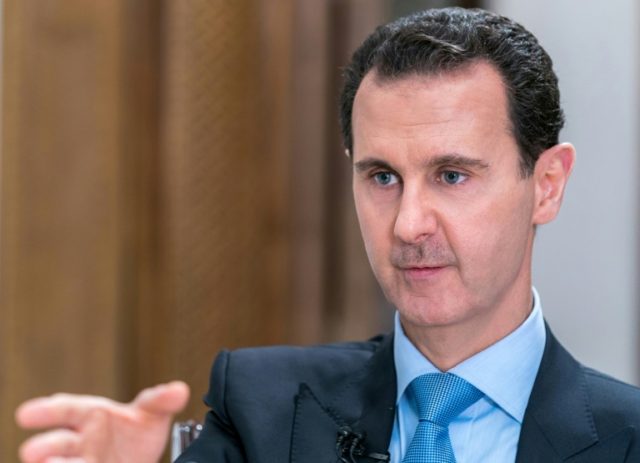U.S. officials said over the weekend that Syrian dictator Bashar Assad has approved the use of banned chemical weapons against rebel positions in Idlib province, adding to worldwide fears of a humanitarian disaster in the final major battle of the Syrian civil war.
The Wall Street Journal on Sunday quoted U.S. officials who said Assad has authorized his military forces to use chlorine gas in Idlib and might have given permission to use far deadlier sarin gas, although intelligence reports on that point are less clear.
The Trump administration has done what it can to rally international opposition to the Idlib offensive and warn Assad and his allies that civilian massacres and chemical weapons attacks will not be tolerated while coming up short of promising military retaliation if those warnings are not heeded:
“I will not comment on U.S. military plans, but Assad’s use of chemical weapons, sarin and chlorine, and disregard for civilian lives is well documented and contrary to regional stability,” Pentagon spokeswoman Dana White said.
Mr. Trump launched airstrikes against Mr. Assad twice in the past two years after accusing the Syrian leader of using sarin gas in attacks that killed scores of civilians, including women and children.
This time, the Trump administration initially set a new red line by warning Mr. Assad that the U.S. would respond if he used chemical weapons. But the administration stance has hardened in recent days, as Mr. Trump has publicly warned Mr. Assad that he risks another U.S. military strike if he tries to retake Idlib.
There is little sign that pressure from the United States, Europe, and the United Nations against Syria, Russia, and Iran will secure relief for the people of Idlib:
International efforts to avert an offensive have failed to dissuade Syria, Russia and Iran as they try to deliver a crippling blow to rebels who appear to be on the verge of defeat after trying for seven years to force Mr. Assad from power. Russia and Syria have stepped up their airstrikes, while thousands of civilians have been evacuated to government-controlled parts of Syria. Mr. Assad has rebuffed appeals from the United Nations, Turkey, the U.S. and others who have warned that an attack could trigger a new humanitarian crisis.
Russian and Syrian airstrikes have killed dozens of civilians, hitting hospitals and emergency medical operations. Russian President Vladimir Putin rejected a direct appeal from Turkish President Recep Tayyip Erdogan at a summit in Tehran on Friday to delay the Idlib offensive and avert a humanitarian nightmare. The summit concluded without any agreement on a ceasefire proposal.
Assad’s forces are once again dropping their notorious “barrel bombs,” cheap and highly indiscriminate weapons with a track record of inflicting horrendous civilian casualties. The London-based Syrian Observatory for Human Rights reported on Sunday that over 60 barrel bombs were dropped on a single village, killing at least two children.
“We pulled children out of the rubble. Where is the world to speak out against these crimes?” a resident of the village of al-Habeet asked.
Reuters quoted Joint Chiefs of Staff chairman Gen. Joseph Dunford saying he is conducting a “routine dialogue” with President Donald Trump to “make sure he knows where we are with regard to planning in the event that chemical weapons are used.”
U.N. officials said on Sunday that over 30,000 civilians have been displaced from their homes by Russian and Syrian airstrikes and artillery bombardments against Idlib over the past week. Half of those civilians have been forced to take shelter in refugee camps.

COMMENTS
Please let us know if you're having issues with commenting.